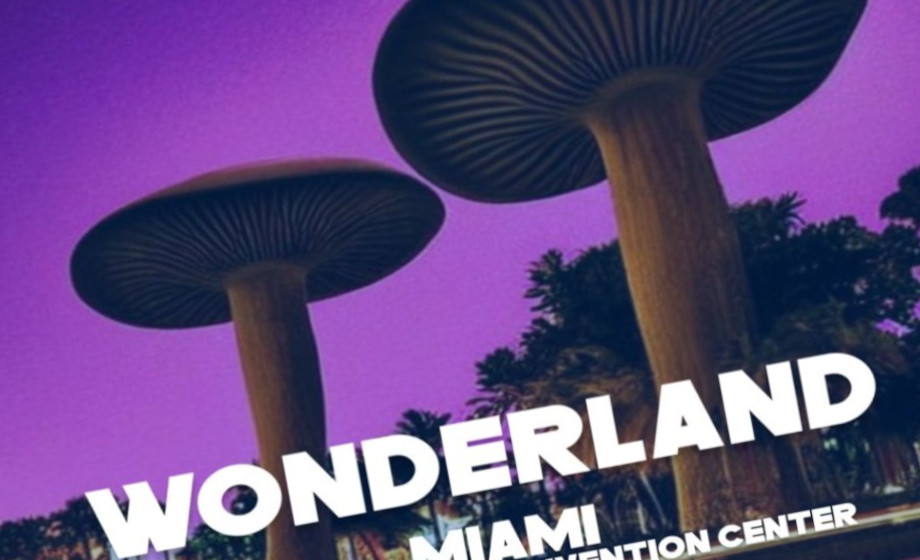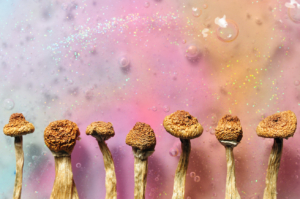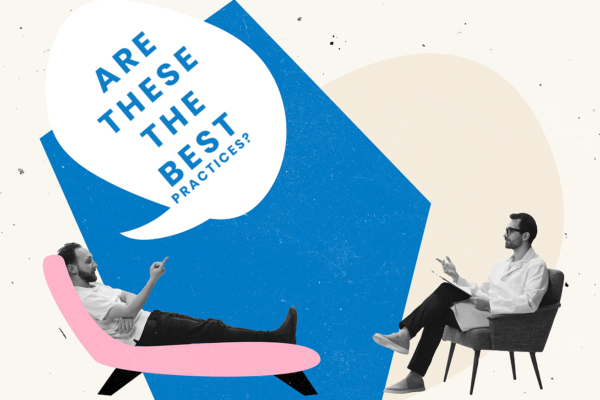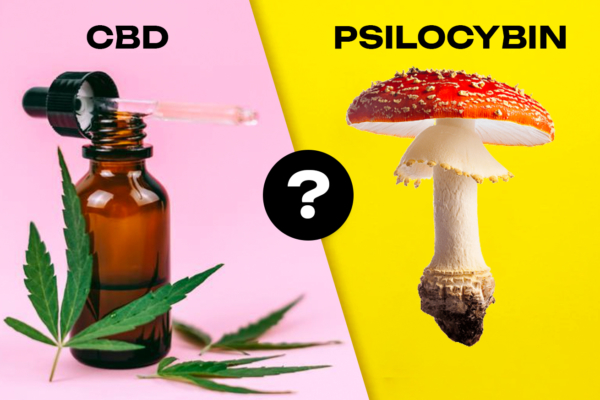
Wonderland Miami is billed as the world’s largest psychedelic conference, drawing fans, media, and corporate executives to witness the latest breakthroughs in the field of psychedelic research and commerce. Presented by Microdose, the second annual Wonderland conference featured presenters from the highest echelons of the psychedelic community sharing their unique perspectives on psychedelic assisted therapy and psychedelic chemistry. However, outside of the event, few people were talking about the presentations being delivered from the main stage. The biggest news from Wonderland this year was the discovery of a list purporting to ban a number of journalists, academics, and industry players from entering the event.
The “banned list” first started circulating on Twitter when an anonymous account named “Head Twitch Mouse” posted a photo of the banned list taken surreptitiously by an event attendee. The list was reportedly left out in the open by an event staffer. Mr. Mouse would not reveal who forwarded the photo, but could confirm that it was received at around “noon Miami time” on the first day of the event. The banned list featured all of the journalists associated with the Psymposia blog and podcast, as well as other independent journalists and former executives of The Conscious Fund, a VC firm which supports many psychedelic corporations, including Microdose.
Welcome to Miami (Will Smith, 1997)
Unless you’re a persona non grata, that is.
Mr. Mouse is wondering, which member of the Microdose team made a macro misstep by leaving this “BANNED FROM ALL EVENTS” sheet out for all to see?
– Mr. Mouse#WonderlandMiami pic.twitter.com/IVDK8f0Sgf
— Head Twitch Memes (@HeadTwitchMemes) November 3, 2022
We reached out to Wonderland organizers at Microdose to verify the existence of this list but they have decided to withhold comments for the time being. However, it was quickly confirmed that individuals were indeed banned from the event when independent journalist Sasha Sisko was forcibly removed from the conference by both event security and Miami police. Sisko was told that they were being removed from the event for registering under a different name. At no point was Sisko informed that they had been placed on a list of people banned from the event. Sisko received their registration credentials from Dr. Rachel Yehuda, a professor of psychiatry and neuroscience at the Mount Sinai School of Medicine. Yehuda had received complimentary passes for the event but could not attend, so she gifted her Wonderland ticket to Sisko, who was then removed from the event for supposedly registering under false pretenses. Ironically, Yehuda was the winner of “Academic of the Year” at the annual Microdose Awards held later that evening.
As far as I know, Sisko is the only person on the banned list who actually attempted to attend the event, and was only able to get in because they had used their official deadname when registering. All other people on the banned list had no intention of actually attending the event. However, once news of the banned list began circulating through the event, their presence loomed large over the proceedings.
The Psymposia Twitter account compiled a thread of instances where members of the banned list were mentioned from the stage. During his time on stage, Dr. Joseph Lichter addressed the issue by saying that banning journalists from events “is not a responsible way forward in the psychedelic space.”
In a later presentation, former TV celebrity turned chemistry consultant for Compass Pathways, Hamilton Morris, took an opportunity to take shots at people who were banned from the event. In a presentation that was supposedly on Psychedelic Chemistry, Morris reportedly called banned academics Brian Pace and Neşe Devenot’s paper on “Right Wing Psychedelia” insane, and referred to the excellent industry reporting from journalist Shayla Love as “moralizing, hand-wringing” articles about the “psychedelic industrial complex.” Although Love did not appear on the banned list (she won “Journalist of the Year” at the previous Microdose Awards), her reporting has been consistently critical of the patent activity of Compass Pathways, Morris’ new employer. Ironically, Vice, where Love published the majority of her writing, was awarded “Consumer Media Company of the Year” at the Microdose Awards.
Hamilton Morris of COMPASS defends industry patents and mocks “moralising, hand-wringing” articles about the “psychedelic-industrial complex”. Criticises @shayla__love, describes @NeseLSD & @brian_pace‘s article on ‘Right-Wing Psychedelia’ as “insane, so absurd”. #WonderlandMiami pic.twitter.com/rwa3LrxM99
— Benjamin Ramm (@BenjaminRamm) November 5, 2022
It is worth noting that Morris was supposed to be presenting on psychedelic chemistry, but instead took the opportunity to attack colleagues from the stage in what appears to be a growing cultural rift. Morris’ official title with Compass Pathways is Chemistry Consultant, but it has been pointed out in previous discussions that there are many chemists working for Compass with far more knowledge and experience than Morris, and his primary value to the company is as a PR agent brought on to help with the negative brand issues created specifically by Love’s reporting. Given the agenda Morris presented —a strong attempt to discredit Compass Pathways’ loudest critics— it has become clear that this is indeed what he was hired to do.
The existence of a Wonderland banned list and Morris’ targeted attacks from the stage highlights what has become a growing rift in the psychedelic movement. Since the Shroom Boom of 2020, corporate psychedelia has dominated the cultural discussion with issues related to patents, intellectual property, clinical trials, and the for-profit therapy model. In service of the for-profit therapy model, there has also been a concurrent movement to frame synthetic psychedelics as preferable to natural psychedelics for reasons of purity, precision of dose, and the fact that proprietary synthetic molecules are easier to patent and profit from than natural sources (which cannot be patented or reliably used in therapy). The for-profit bias also shows strong disdain for local legalization and decriminalization movements —decriminalization would take profits and control away from the industry that seeks to regulate psychedelics for medical use.
Looking over the banned list it is easy to guess why most of these people made the cut. The entire team at Psymposia was banned, presumably for their ongoing critique of psychedelic capitalism, psychedelic authoritarianism, and the breakthrough podcast “Power Trip” which exposed some of the abuses and lapses in ethical behavior dogging the nascent psychedelic renaissance. Psychedelic harm reduction advocate and drug policy activist Yarelix Estrada also made this list, presumably for similar corporate critiques in her writings and public speaking. Sasha Sisko has made many public critiques of psychedelic industry leaders on their Twitter feed, repeatedly highlighting bizarre takes from the likes of MAPS Executive Director Rick Doblin and psychedelic VC Christian Angermeyer, both of whom were presenting at Wonderland. By removing Sisko from the event, and banning the other independent journalists, the Wonderland organizers made sure that no uncomfortable questions would be raised from the audience during their featured presentations.
It is somewhat more of a mystery why Michael Hoyos and Anthony Ruizcalderon were also banned from the event. Neither of these people are journalists, nor have they been vocal critics of the psychedelic movement. In fact, Hoyos was a co-founding partner of The Conscious Fund, and Ruizcalderon was a Senior Principal and Chief of Staff and Operations for the fund. Both Hoyos and Ruizcalderon resigned from The Conscious Fund last year for unknown reasons. I reached out to Hoyos for comment on this story but he was reluctant to say anything on the record, other than he was no longer associated with The Conscious Fund because of “integrity”, and repeated his public Twitter sentiment that the Wonderland organizers and Microdose corporate team were “clowns”.
“Events like #WonderlandMiami and the clowns putting it on make the entire psychedelic medicine industry look like an absolute joke. It really baffles me how anyone can take them seriously.”
Events like #WonderlandMiami and the clowns putting it on make the entire psychedelic medicine industry look like an absolute joke. It really baffles me how anyone can take them seriously.
— Michael Hoyos (@mikevanhoyos) November 4, 2022
As someone who has organized psychedelic events in the past, the news of this banned list comes with mixed feelings. When organizing psychedelic conferences in the 1990s there were times when I or other organizers were forced to ban specific individuals for being problematic. In one instance, an author who was not invited to present at a conference threatened to call the police and have the entire event raided, forcing organizers to ban that individual and switch venues at the last minute. At another conference where I was presenting, my former business partner from Psychedelic Illuminations Magazine showed up intoxicated and began selling merchandise without permission from the organizer, who he was also feuding with. He was forcibly removed by the event organizer in a very heated scene. In both of these cases, it was problematic and disruptive behavior that forced these individuals to be banned from the events. However, in the case of Wonderland Miami, it appears the individuals were banned because their presence might cause discomfort for some of the higher profile guests.
In a strange twist to this story, there was a rumor going around that the people on the banned list were placed there because they had all at some point threatened physical violence against MAPS Executive Director Rick Doblin. Doblin has since denied that this is true, and claims although he felt some of the criticisms were “unfair,” he never felt any threat of physical violence from anyone on the banned list.
@RickDoblin confirmed to us that he’d heard the rumor when the banned list began circulating but that he wasn’t the source and didn’t believe it. “I know that none of you would want to hurt me physically…[none of your critiques] made me think I was in physical danger” 9/11 pic.twitter.com/DkcKOIukmk
— Psymposia (@psymposia) November 6, 2022
Microdose has not commented on this story so the origin of the banned list will for now remain a mystery. However, following this event it is clear that a line has been drawn in the psychedelic sand and people are taking sides. The for-profit psychedelic therapy community has shown that it feels threatened by even the most innocuous criticism of intellectual property rights, and that they are not interested in legalization, decriminalization, or any talk of recreational, religious, or personal use outside of the for-profit medical model. Corporate psychedelia has created a privileged class of industry insiders, and if you are not showing up to specifically amplify their message, you could find yourself on the outside looking in.
Editor’s Note – This article has been updated with the following changes: Chacruna is not affiliated with Microdose or Wonderland; the Twitter thread detailing the event was created on the Psymposia feed, not by Neşe Devenot; Yarelix Estrada is a drug policy advocate and not a journalist.
Financial Disclosure: Psychedelic Spotlight’s parent company, PSYC Corp, has a $150K investment in The Conscious Fund since January 2021.





